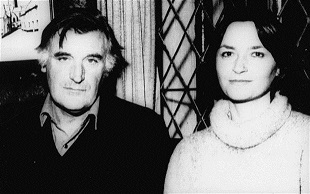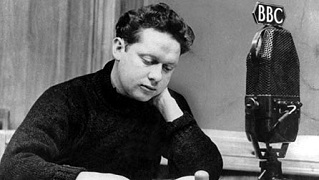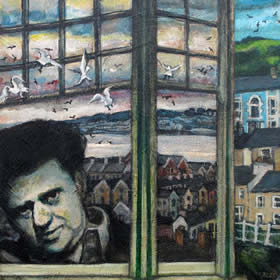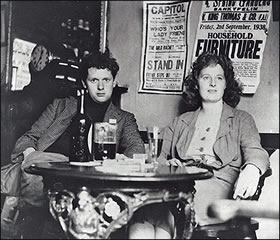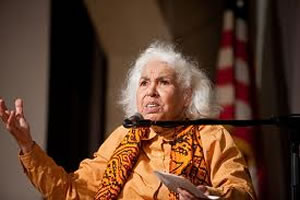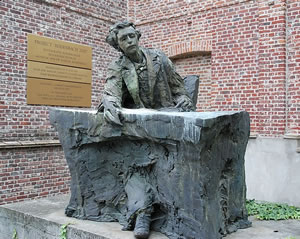De Engelse dichter Dylan Thomas werd geboren op 27 oktober 1914 in Swansea in Wales. Zie ook mijn blog van 27 oktober 2006 en ook mijn blog van 27 oktober 2007.
A Process in the Weather of the Heart
A process in the weather of the heart
Turns damp to dry; the golden shot
Storms in the freezing tomb.
A weather in the quarter of the veins
Turns night to day; blood in their suns
Lights up the living worm.
A process in the eye forwarns
The bones of blindness; and the womb
Drives in a death as life leaks out.
A darkness in the weather of the eye
Is half its light; the fathomed sea
Breaks on unangled land.
The seed that makes a forest of the loin
Forks half its fruit; and half drops down,
Slow in a sleeping wind.
A weather in the flesh and bone
Is damp and dry; the quick and dead
Move like two ghosts before the eye.
A process in the weather of the world
Turns ghost to ghost; each mothered child
Sits in their double shade.
A process blows the moon into the sun,
Pulls down the shabby curtains of the skin;
And the heart gives up its dead.
Do Not Go Gentle Into That Good Night
Do not go gentle into that good night,
Old age should burn and rave at close of day;
Rage, rage against the dying of the light.
Though wise men at their end know dark is right,
Because their words had forked no lightning they
Do not go gentle into that good night.
Good men, the last wave by, crying how bright
Their frail deeds might have danced in a green bay,
Rage, rage against the dying of the light.
Wild men who caught and sang the sun in flight,
And learn, too late, they grieved it on its way,
Do not go gentle into that good night.
Grave men, near death, who see with blinding sight
Blind eyes could blaze like meteors and be gay,
Rage, rage against the dying of the light.
And you, my father, there on that sad height,
Curse, bless, me now with your fierce tears, I pray.
Do not go gentle into that good night.
Rage, rage against the dying of the light.
Love In the Asylum
A stranger has come
To share my room in the house not right in the head,
A girl mad as birds
Bolting the night of the door with her arm her plume.
Strait in the mazed bed
She deludes the heaven-proof house with entering clouds
Yet she deludes with walking the nightmarish room,
At large as the dead,
Or rides the imagined oceans of the male wards.
She has come possessed
Who admits the delusive light through the bouncing wall,
Possessed by the skies
She sleeps in the narrow trough yet she walks the dust
Yet raves at her will
On the madhouse boards worn thin by my walking tears.
And taken by light in her arms at long and dear last
I may without fail
Suffer the first vision that set fire to the stars.
Dylan Thomas (27 oktober 1914 – 9 november 1953)
De Amerikaanse dichteres en schrijfster Sylvia Plath werd geboren op 27 oktober 1932 in Jamaica Plain, een buitenwijk van Boston. Zie ook mijn blog van 27 oktober 2006.
Dark House
This is a dark house, very big.
I made it myself,
Cell by cell from a quiet corner,
Chewing at the grey paper,
Oozing the glue drops,
Whistling, wiggling my ears,
Thinking of something else.
It has so many cellars,
Such eelish delvings!
U an round as an owl,
I see by my own light.
Any day I may litter puppies
Or mother a horse. My belly moves.
I must make more maps.
These marrowy tunnels!
Moley-handed, I eat my way.
All-mouth licks up the bushes
And the pots of meat.
He lives in an old well,
A stoney hole. He’s to blame.
He’s a fat sort.
Pebble smells, turnipy chambers.
Small nostrils are breathing.
Little humble loves!
Footlings, boneless as noses,
It is warm and tolerable
In the bowel of the root.
Here’s a cuddly mother.
Gigolo
Pocket watch, I tick well.
The streets are lizardy crevices
Sheer-sided, with holes where to hide.
It is best to meet in a cul-de-sac,
A palace of velvet
With windows of mirrors.
There one is safe,
There are no family photographs,
No rings through the nose, no cries.
Bright fish hooks, the smiles of women
Gulp at my bulk
And I, in my snazzy blacks,
Mill a litter of breasts like jellyfish.
To nourish
The cellos of moans I eat eggs –
Eggs and fish, the essentials,
The aphrodisiac squid.
My mouth sags,
The mouth of Christ
When my engine reaches the end of it.
The tattle of my
Gold joints, my way of turning
Bitches to ripples of silver
Rolls out a carpet, a hush.
And there is no end, no end of it.
I shall never grow old. New oysters
Shriek in the sea and I
Glitter like Fontainebleau
Gratified,
All the fall of water and eye
Over whose pool I tenderly
Lean and see me.
Night Shift
It was not a heart, beating.
That muted boom, that clangor
Far off, not blood in the ears
Drumming up and fever
To impose on the evening.
The noise came from outside:
A metal detonating
Native, evidently, to
These stilled suburbs nobody
Startled at it, though the sound
Shook the ground with its pounding.
It took a root at my coming
Till the thudding shource, exposed,
Counfounded in wept guesswork:
Framed in windows of Main Street’s
Silver factory, immense
Hammers hoisted, wheels turning,
Stalled, let fall their vertical
Tonnage of metal and wood;
Stunned in marrow. Men in white
Undershirts circled, tending
Without stop those greased machines,
Tending, without stop, the blunt
Indefatigable fact.
Sylvia Plath (27 oktober 1932 – 11 februari 1963)
De Iraanse schrijver en filmmaker Reza Allamehzadeh werd geboren op 27 oktober 1943 in Sari, Mazandaran. Hij studeerde regie aan de academie voor film en televisie in Teheran. In1983 vluchtte hij , zoals velen, uit zijn vaderland. Tegenwoordig woont hij in Nederland. Hij maakte onder meer tv-documentaires voor de RVU en de hartverscheurende speelfilm ‘The guests of Hotel Astoria’, over Iraanse vluchtelingen. Ook gaf hij cursussen over film.o.a. aan de Hollins University in Virginia en Leeds Metropolitan University. Bittere zomer’ was het eerste boek van hem dat in het Nederlands verscheen (hij schreef het in het Farsi).
Werk o.a.: “My Great Secret” 1995, “Bitter Summer”, 1996, “Confidential Travelogue”, 1997, “The Private Album”, 1999
Uit: Bittere Zomer (Vertaald door Gert J.J. de Vries)
“Ik had net de maaltijd op en dacht erover me in het bassin te gaan baden alvorens naar Foezijeh te vertrekken. Op dat moment hoorde ik iemand op de deur kloppen.
Firoez. Ik was zo stomverbaasd dat hij er verlegen van werd. Ik wist wel dat hij mijn adres had en wist dat ik alleen thuis was, maar ik had hem nooit hier aan de deur verwacht. Hij zei dat hij vannacht bij me kon blijven logeren, dat zijn vader dat goedgevonden had. Ik wist niet zeker, of dat helemaal klopte, maar hij had zo’n uitstraling van eerlijkheid en hij kon zo smekend kijken, dat ik hem wel moest geloven. Ik zag hem naar het shirt kijken dat ik in mijn hand hield, en voordat hij iets kon vragen vertelde ik dat ik op het punt stond om te gaan baden. Hij wierp een blik op het bassin van twee bij twee meter en zei:
“Als er plaats is kom ik er ook in!”
Ik gaf hem een speelse klap achter in zijn nek en sprong toen in mijn onderbroek het water in. Waarop hij zijn kleren ook op de houten ligbank legde en op de rand van het bassin ging zitten. Hij leek te kleumen van de kou. Ik spatte wat water op zijn bovenlichaam en trol hem aan zijn hand de vijver in. Om hem te plagen duwde ik hem een paar keer kopje-onder en liet hem dan weer gaan. Hij raakte buiten adem, maar moest toch lachen. Op zijn beurt probeerde hij mij onder water te krijgen, maar had daar de kracht niet voor. Totdat ik meegaf en me kopje-onder liet gaan. Zijn armen waren onder me weggegleden, maar met één hand hield hij me stevig achter in mijn nek omklemd en duwde hij mijn hoofd naar beneden. Na enkele keren hurkte ik onverhoeds neer in het water en trok de argeloze Firoez naar beneden. Ik had zelf mijn gezicht boven w
ater en liet hem pas los toen ik hem hoorde rochelen. Hij kwam met rode ogen omhoog, buiten adem maar nog steeds lachend: “Hé, je hebt me zowat verzopen!”

Reza Allamehzadeh (Sari, 27 oktober 1943)
De Egyptische schrijfster, gynaecologe, moslimfeministe en politiek activiste Nawal el Saadawi werd geboren in Kafr Tahla op 27 oktober 1931. Haar werk bevat toneelstukken, romans en werken over de religieus opgelegde plichten van vrouwen in Abrahamitische religies (in het bijzonder de islam), geweld tegen vrouwen en mensenrechtenactivisten en feminisme. El Saadawi ging geneeskunde studeren aan de Universiteit van Caïro en voltooide deze studie in 1955. Naderhand bereikte ze de status van Directeur Openbare gezondheid op het Ministerie van Gezondheid. In die functie ontmoette ze ook haar derde echtgenoot, Sherif Hetata, met wie ze de kantoorruimte deelde. Hetata had 13 jaar gevangenschap achter de rug vanwege zijn politieke stellingname. Ook Nawal bleef niet verstoken van moeilijkheden vanwege haar kritiek op misstanden in de Egyptische samenleving: ze werd in 1972 ontslagen bij het Ministerie vanwege haar politieke activiteiten en haar boek “Women and sex”.
Omdat ze al sinds 1982 doodsbedreigingen kreeg van islamistische fundamentalisten verliet El Saadawi in 1991 Egypte en verhuisde naar de Amerikaanse staat North Carolina. Ze gaf in de Verenigde Staten college aan de Duke University te Durham en aan de Washington State University te Pullman in de staat Washington. In 1996 keerde ze terug naar Egypte en pakte haar politiek activisme daar weer op. Ze wilde zich kandidaat stellen voor de eerste vrije presidentiële verkiezingen in 2005, maar trok zich terug vanwege de zware voorwaarden die gesteld werden. Eind februari 2007, terwijl ze in Brussel verbleef, werd bekend dat sjeik Mohammed Seyed Tantawi van de Al-Azhar Universiteit een fatwa en de doodstraf op grond van de sharia over haar heeft uitgesproken wegens geloofsafval, vanwege een in Egypte gepubliceerd toneelstuk dat aldaar inmiddels een verboden boek geworden is.
Uit: The Hidden Face of Eve
“lf way between wakefulness and sleep, with the rosy dreams of childhood flitting by, like gentle fairies in quick succession. I felt something move under the blankets, something like a huge hand, cold and rough, fumbling over my body, as though looking for something. Almost simultaneously another hand, as cold and as rough and as big as the first one, was clapped over my mouth, to prevent me from screaming. They carried me to the bathroom. I do not know how many of them there were, nor do I remember their faces, or whether they were men or women. The world to me seemed enveloped in a dark fog winch prevented me from seeing. Or perhaps they put 4ome kind of a cover over my eyes. All I remember is that I was frightened and that there were many of them, and that something hke an iron grasp caught hold of my hand and my arms and my thighs, so that I became unable to resist or even to move. I also remember the icy touch of the bathroom tiles under my naked body, and unknown voices and humming sounds interrupted now and again by a rasping metallic sound which reminded me of the butcher when he used to sharpen his knife before daughtering a sheep for the Eid’ . My blood was frozen in my veins. It looked to me as though some thieves had broken into my room and kidnapped me ftom my bed. They were getting ready to cut my throat which was always what happened with disobedient girls fike myself in the stories that my old rural grandmother was so fond of telling me. I strained my ears trying to catch the rasp of the metallic sound. The moment it ceased, it was as though my heart stopped beating with it. I was unable to see, and somehow my breathing seemed also to have stopped. Yet I imagined the thing that was making the rasping sound coming closer and closer to me. Somehow it was not approac@ng my neck as I had expected but another part of my body. Somewhere below my belly, as though seeking something buried between my thighs. At that very moment I realized that my thighs had been pulled wide apart, and that each of my lower limbs was being held as far away ftom the other as possible, gripped by-steel fingers that never relinquished their pressure. I felt that the rasping knife or blade was heading straight down towards my throat. Then suddenly the sharp metallic edge seemed to drop between my thighs and there cut off a piece of flesh from my body. I screamed with pain despite the tight hand held over my mouth, for the pain was not just a pain, it was like a searing flame that went through my whole body. After a few moments, I saw a red pool of blood around my hips. I did not know what they had cut off from my body, and I did not try to find out. I just wept, and called out to my mother for help. But the worst shock of all was when I looked around and found her standing by my side. Yes, it was her, I could not be mistaken, in flesh and blood, right in the midst of these strangers, talking to them and smiling at them, as though they had not participated in slaughtering her daughter just a few moments ago.”

Nawal el Saadawi (Kafr Tahla, 27 oktober 1931)
De Britse schrijfster Enid Algerine Bagnold werd geboren op 27 oktober 1889 in Rochester, Kent. Zij baarde in 1923 opzien met haar roman The Difficulty of Getting Married. Internationaal het bekendste en succesvolste werk van haar is National Velvet uit 1935. Het kinderboek werd in 1944 verfilmd door Clarance Brown met o.a. Elizabeth Taylor. Bagnold schreef ook vanaf het begin gedichten die in verschillende bloemlezingen werden gepubliceerd.
Uit: THE HAPPY FOREIGNER
“COME in,” she said in English, lifting her head and all her mind and spirit out of the pit of the pillow.
Feet came further into the room and a shivering child held a candle in her face. “Halb sechs, Fräulein,” it said. But the Fräulein continued to stare at him. He thought she was not yet awake–he could not tell that she was counting countries in her head to find which one she was in–or that she was inclining towards the theory that she was at school in Germany. He was very cold in his shirt and little trousers, and he pulled at her sheets. “Fräulein !” he said again with chattering teeth, and when she nodded more collectedly the little ghost slipped out relieved by the door. “Russian colonel . . . I must get up. Fancy making that boy call me! Why couldn’t someone older . . . I must get up.”
He had left the electric light burning in her room, but out in the corridor all was black and hushed as she had left it the night before when she had gone to bed. Behind the kitchen door there was a noise of water running in the sink. She opened the door, and there was the wretched child again, still in his shirt, rinsing out her coffee-pot by the light of one candle. Well, since he was doing it . . . Poor child! But she must have her coffee. By the time she was dressed he tapped again and brought in the tray with coffee, bread and jam on it. Setting it down, he looked it over with an anxious face. “Zucker,” he said, and disappeared to fetch it. She filled her thermos bottle with the rest of the coffee which she could not finish, and put two of the slices of grey bread into the haversack, then crept downstairs and out into the black street where the gas lamps still burnt and the night sentry still paced up and down in the spectral gloom. Over the river hung a woolly fog, imprisoning the water; but as she crossd the bridge she noticed where its solidity was incomplete and torn, and into the dark water which lay at the bottom of such crevasses a lamp upon the bridge struck its arrowed likeness. It was a good seven minutes’ walk to the garage, and she tried to get warm by running, but the ice crackling in the gutters and between the cobble stones defied her, and her hands ached with cold though she put them in turn right through her blouse against her heart to warm them as she ran. Fetching her car she drove to the Hôtel Royal, and settled down to wait.”

Enid Bagnold ( 27 oktober 1889 – 3 maart 1981)
De Engelse schrijfster Zadie Smith werd geboren op 27 oktober 1975 en woonde in de Londense gemeente Brent bij haar Engelse vader Harvey Smith en zijn tweede vrouw Yvonne McLean, van Jamaicaanse afkomst. Op 14-jarige leeftijd veranderde Sadie haar naam in Zadie.Tijdens haar universitaire opleiding in Engelstalige literatuur aan de universiteit van Cambridge, publiceerde Zadie Smith een aantal korte verhalen in de May Anthologies. Op basis hiervan boden diverse geïnteres
seerde uitgevers haar een contract aan. Haar eerste roman, White Teeth, werkte ze af tijdens haar laatste jaar aan de universiteit. Eenmaal gepubliceerd, werd het onmiddellijk een bestseller. Het werd internationaal erkend als een schitterend debuut en viel meer dan eens in de prijzen Haar derde roman, On Beauty, werd gepubliceerd in september 2005 en werd voorgedragen voor de Man Booker Prize. In 2006 won On Beauty de Orange Prize for Fiction.
Uit: White Teeth
“Early in the morning, late in the century, Cricklewood Broadway. At 06.27 hours on 1 January 1975, Alfred Archibald Jones was dressed in corduroy and sat in a fume-filled Cavalier Musketeer Estate face down on the steering wheel, hoping the judgement would not be too heavy upon him. He lay forward in a prostrate cross, jaw slack, arms splayed either side like some fallen angel; scrunched up in each fist he held his army service medals (left) and his marriage license (right), for he had decided to take his mistakes with him. A little green light flashed in his eye, signaling a right turn he had resolved never to make. He was resigned to it. He was prepared for it. He had flipped a coin and stood staunchly by its conclusions. This was a decided-upon suicide. In fact it was a New Year’s resolution.
But even as his breathing became spasmodic and his lights dimmed, Archie was aware that Cricklewood Broadway would seem a strange choice. Strange to the first person to notice his slumped figure through the windscreen, strange to the policemen who would file the report, to the local journalist called upon to write fifty words, to the next of kin who would read them. Squeezed between an almighty concrete cinema complex at one end and a giant intersection at the other, Cricklewood was no kind of place. It was not a place a man came to die. It was a place a man came in order to go other places via the A41. But Archie Jones didn’t want to die in some pleasant, distant woodland, or on a cliff edge fringed with delicate heather. The way Archie saw it, country people should die in the country and city people should die in the city. Only proper. In death as he was in life and all that. It made sense that Archibald should die on this nasty urban street where he had ended up, living alone at the age of forty-seven, in a one-bedroom flat above a deserted chip shop. He wasn’t the type to make elaborate plans — suicide notes and funeral instructions — he wasn’t the type for anything fancy. All he asked for was a bit of silence, a bit of shush so he could concentrate. He wanted it to be perfectly quiet and still, like the inside of an empty confessional box or the moment in the brain between thought and speech. He wanted to do it before the shops opened.

Zadie Smith (Londen, 27 oktober 1975)
De Amerikaanse schrijfster Frances Ann “Fran” Lebowitz werd geboren op 27 oktober 1950 in Morristown, New Jersey. Na van school te zijn gestuurd had zij verschillende baantjes totdat Andy Warhol haar vroeg voor een column in Interview. Haar eerste boek was een verzameling essays onder de titel Metropolitan Life en verscheen in 1978. In 1981 volgde Social Studies. Lebowitz staat bekend om haar sardonische commentaar op de Amerikaanse “way of life”.
Uit: Progress
“So then, let us consider the likelihood that the empty pews were less the result of a lesser fear of God than they were an indication of a greater fear of the godless. In other words, let us suppose that the Red Scare was enough scare and that the whole thing was, as might well have been suspected, a Communist plot.
And let us assume that a citizenry fully occupied with the questions of the day, a citizenry busy leading and misleading the way—marching on Washington, appearing before Senate subcommittees, putting fluoride in the drinking water, and barring children from the schoolhouse door—was a citizenry too engaged by the demands of democracy to be lured by the commands of religion.
And let us lament that there is no longer a need to imagine the consequences of the failure of imagination that is the consequence of a religiosity so pervasive that it has replaced that which is possible with that which is impossible.
And let us admit that where there is less religion there is more progress. And that this has been true not only throughout the entire history of the whole world
but even in the United States of America. And let us understand that if you do not have a greater belief in democracy than you do in your religion you will eventually have less democracy. And that you may even lose your religion, because, as it turns out, the only people who are really tolerant of other people’s religions are people who are really not that religious.”
Fran Lebowitz (Morristown, 27 oktober 1950)
De Poolse schrijver Kazimierz Brandys werd geboren op 27 oktober 1916 in Lodz. Hij studeerde rechten in Warschau en debuteerde in 1935 als theatercriticus. Van 1945 tot 1950 was hij verbonden aan het tijdschrift “Kuźnica”en van 1956 tot 1969 aan “Nowa Kultura”. Hij doceerde ook slavische literatuur aan de Sorbonne in Parijs. Vanaf 1978 woonde hij buiten Polen.
Uit: Warschauer Tagebuch
“In Polen äußert sich die Genugtuung zumeist in einem Scherz. Als Wałęsa den Streik in Danzig für beendet erklärte, sagte er zu den Werftarbeitern: “Und jetzt geht jeder nach Hause und guckt nach, ob nicht etwas weg- oder dazugekommen ist, und dann ab in die Heia.”
Diese Worte werden sicherlich nicht in die Geschichte eingehen. Sie sollten es aber. In ihnen äußert sich ein freundlicher, unprätentiöser Charakterzug der Polen, der die Ergriffenheit lieber hinter einem Witz versteckt. Ich kenne kein zweites Land, in dem Führer der Arbeiterklasse nach einem großen, siegreichen Streik Tausenden seiner Mitkämpfer die Worte hinwirft: “Ab in die Heia.”
Kazimierz Brandys (27 oktober 1916 – 11 maart 2000)
De Belgische dichter en schrijver Albrecht Rodenbach werd geboren te Roeselare op 27 oktober 1856. Zie ook mijn blog van 27 oktober 2006.
REGENDAG
Och hoe droevig sleept de dag. Betrokken
ligt de lucht met wolken grijs en grauw,
’t stuifreînt, en die hooge boomen schokken
hunne kruinen, en vol vreemde rouw
ruischen zij, ontblaadrend, droeve zangen.
Lijk des avonds in het woud een dolend kind,
daar beneden door de donkre gangen
aaklig schreeuwt en huilt de wilde wind.
Sombre wolken door mijn ziel ook zweven,
nevelig betrekt mijn zonneglans.
Houd u sterk, o jongling, dat is ’t leven.
Weze uw droefheid lijk uw vreugd — eens mans.
DICHTERLIEFDE
naar Heyne op musiik van Schumann
Mijne tranen baren bloemen
lijk lentelach over de wei,
en mijne zuchten worden
een nachtegalenrei.
En wils du mi wederlieven,
voor di bloem op bloemken ontschiet,
en voor dijne venster zal klingen
der nachtegalen lied.
Albrecht Rodenbach (27 oktober 1856 – 23 juni 1880)
